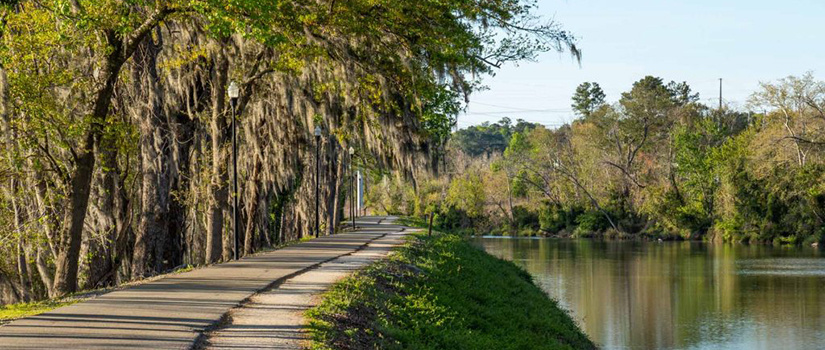Advance Your Career with a Certificate in Environmental Law and Sustainability
This 18-hour, post-bachelor’s degree is designed for environmental professionals, business leaders, advocates, policy makers, and scientists seeking to advance their careers by learning strategies to reduce environmental impacts while enhancing economic sustainability.
Students will gain an advanced understanding of environmental and energy systems, applicable laws and regulations in the United States, and legal risks inherent to the field to meet the opportunities that are transforming major economic sectors and populations around the world.
Taught by accomplished environmental law attorneys and professionals, this program is 100% online, on-demand, and has no GRE or LSAT requirements.
This certificate is ideal for:
- Environmental health and safety managers
- Policy makers
- Biologists
- Engineers
- Attorneys and paralegals
- Manufacturers
- Energy industry professionals
- Developers
- Ecologists
- Environmental justice advocates
Tuition and Fees
- Resident & Non-Resident Students — $780 per credit hour
- Technology Fee — $150 per term
Students enrolled in the M.L.S. degree will not be allowed to enroll in courses offered in the J.D. program. Students in the J.D. program will not be allowed to enroll in courses in the M.L.S. degree program.
Curriculum
Students take 15 hours of required coursework and 3 hours of electives.
This course introduces students to the law and legal nomenclature. It addresses broad legal concepts such as sources of law; basic principles of contracts, torts, criminal and civil procedure, and business associations; dispute resolution; jury trials; and the risks of litigation.
The purpose of this introductory environmental law course will give students a background in several federal environmental statutes, including NEPA (National Environmental Policy Act) CERCLA (Comprehensive Environmental Response, Compensation and Liability Act) ESA (Endangered Species Act) and CWA (Clean Water Act).
This seminar will explore legal and regulatory options for addressing global climate change. We will begin with materials examining the scientific evidence and projections of climate change, then move on to attempts at international legal and quasi-legal mechanisms, including the United Nations Framework Convention on Climate Change, the Kyoto Protocol, and the Copenhagen Accord. We will also cover U.S. domestic climate policy options, including regulation under the Clean Air Act and at state level, and contrast these policies with those in place in other developed economies. Throughout, we will discuss the uniquely difficult challenges climate change creates for institutions, society, and the legal system.
This course explores the foundations, tenets, and practices of the environmental justice movement, with its focus on centering and addressing the needs of people and communities that bear disproportionate environmental burdens. The course will include examinations of the history and theory of environmental justice in the United States, its application to a range of case studies, and its intersections with other emerging fields of justice studies—including climate change justice, energy justice, and food justice.
This course explores legal approaches to avoiding and resolving conflicts between human use of coastal areas and the ecological integrity of coastal systems. We will cover relevant South Carolina and Federal law, looking at issues both above and below the tide line. Course readings represent a variety of disciplines, including law, economics, and the natural sciences. Graduation Requirement: This course satisfies the perspective course requirement.
This course introduces the law and regulation of energy resources, primarily in the United States, focused on three core areas within the field. The first part of the course will cover extraction of energy resources, primarily coal, oil, and natural gas. The second part will cover regulation of the electricity generation and distribution system, including public utility and rate regulation, transmission, and relevant environmental regulations. The final part of the course will address legal and regulatory issues specific to nuclear and renewable energy, with a particular focus on the Southeast. Throughout, the course will focus on the ability (or inability) of legal and regulatory regimes to keep pace with rapid change in the energy sector.
Government agencies regulate almost every area of our lives. Many lawyers work for government agencies and many other lawyers work for people whose lives are affected by these agencies. Virtually every lawyer needs to know how government agencies operate. That is the subject of this course. The course is recommended for students interested in substantive areas in which agencies play an important role, such as environmental law, health-care law, and securities law (to name a few).
Admissions
- Resume/CV
- Bachelor’s degree from an accredited university
- Undergraduate degree performance
- GRE or LSAT scores (optional)
- Statement of interest in the program
- Two recommendations from professional or academic references
Want more information?
Please fill out our program inquiry form and a representative will be in touch shortly.
